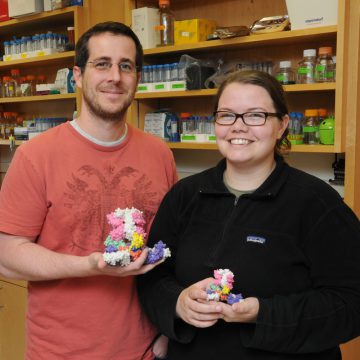Growing up in a small fishing town in the Acadia region of Maine, Morgan Gilman developed an early appreciation for the natural beauty of her surroundings and the generosity of others.
“My family didn’t have a lot of money and there were times we received help from social programs, where my mother often volunteered, to get by,” recalls Gilman, a PhD-candidate in the Molecular and Cellular Biology (MCB) program at Dartmouth’s Geisel School of Medicine.
“We were lucky to be in a close-knit community where people would reach out and help us when we needed it,” she says. “That said, for my family and others, it isn’t very common to leave, so I didn’t have a lot of exposure to opportunities outside of that setting.”
But when Gilman, an excellent student, was offered a scholarship from the Veteran’s Association (as a child of a disabled veteran) to attend the University of Maine at Orono, she jumped at the chance. After initially focusing on mathematics, she became “rapidly addicted” to science, earning a bachelor’s degree in microbiology a master’s in biochemistry at Orono.
“I knew I wanted to earn a PhD eventually, but I wasn’t sure of the best path,” Gilman says. Landing a job working as a technician in the laboratory of Margie Ackerman, PhD, at the Thayer School of Engineering provided valuable experience and introduced her to what would become her area of focus as a researcher—the molecular mechanisms of viruses (in this case HIV).
“It was a really good opportunity to learn—she had a great post-doc who I was able to team up with,” she says. “Margie also encouraged me to apply to graduate school, and I ended up joining the MCB program, where you rotate through a few different labs and sort of choose a home.”
For Gilman, now a fourth-year graduate student, that home has been the laboratory of Jason McLellan, PhD, where she is helping lead efforts to understand how a particular type of protein (known as class I fusion glycoproteins) allows deadly viruses—such as Ebola and RSV (respiratory syncytial virus)—to gain entry into host cells, and how antibodies can be developed to neutralize that process.

“Our lab has the right number and composition of people, and we all get along really well,” she says. “Jason is a great mentor—he does an excellent job of giving us the individual time we need on our projects but also personal advice for the next phase of our careers. Being here has given me some wonderful opportunities.”
In 2016, Gilman published two co-first-author manuscripts in prestigious journals and then presented their findings at international conferences in Paris, France and Bariloche, Argentina.
The first paper, published in the journal Science, described how the Dartmouth team collaborated with scientists from the National Institute of Allergy and Infectious Disease and other colleagues to characterize an antibody that shows great promise as a potential therapeutic for Ebola.
There is still no cure or specific treatment for the virus, which killed more than 11,000 people during a 2014-15 outbreak in West Africa.
“One of the challenges with Ebola is that the glycoprotein starts out large and then gets trimmed down substantially during the different stages of entry,” says Gilman. “This ‘tricks’ the immune system—a lot of times antibodies will bind to regions that get cut off. But the antibody we were working with, known as mAb114, was unique in that it stayed bound during the entire process, preventing entry.”
The second paper, published in Science Immunology, described how the Dartmouth team, working with the local company Adimab, characterized 360 monoclonal antibodies against the RSV F protein that were isolated from memory B cells of adults. The work has brought novel insights into efforts to develop a vaccine and passive prophylaxis for RSV—an extremely common and highly contagious respiratory pathogen that is globally responsible for about 7 percent of deaths among infants between one month and one year of age.
“Our approach on the RSV study was a bit more global. Rather than trying to understand how one or two antibodies worked, we were trying to understand what types of responses humans have when they get infected,” says Gilman, who utilized a high-throughput Luminex-based assay (a technique she learned in the Ackerman Lab) to determine the binding sites of the antibodies. “Working with the RSV F protein, which I spend most of my time doing now, has been very intriguing—it has some characteristics that make it unpredictable.”
For her efforts, Gilman received the prestigious E. Lucille Smith Award for Excellence in Biochemistry from the Department of Biochemistry and Cell Biology in 2017. Named for an internationally acclaimed scientist who became the first woman at Dartmouth to attain the rank of full professor in 1964, the Smith award recognizes a graduate student each year that “demonstrates exceptional commitment and outstanding scholarship in biochemistry as primary author on publication(s) during the previous year.”
“Morgan is very deserving of this recognition,” says McLellan, who submitted her nomination. “She’s the first person people turn to for help in the lab, she’s extremely generous with her time, and she has a tremendous work ethic. I think she’s poised for an excellent career in science.”
“It was truly an honor to receive the award; it’s given me a lot of encouragement to keep pursuing my long-term goals of becoming a PI (principal investigator) and having my own lab some day,” says Gilman, who has also enjoyed participating in community events like Science Day at Geisel, which exposes school children to different aspects of the discipline. “You never know, some of them might have the potential to love science—they just may not know it yet.”